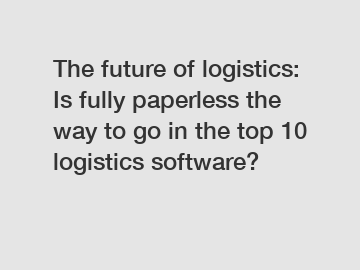The future of logistics: Is fully paperless the way to go in the top 10 logistics software?
The Future of Logistics: Is Fully Paperless the Way to Go in the Top 10 Logistics Software?
In today's ever-evolving world, technology plays a crucial role in revolutionizing various industries, and logistics is no exception. With the rise of digitalization, the logistics landscape has undergone substantial transformations, making it imperative to adapt to the changing dynamics. One significant aspect that has gained significant attention is the shift towards a paperless future. But is embracing a fully paperless approach truly the way to go in the top 10 logistics software? Let's delve into this question and explore the pros and cons of such a transformation.
1. Enhanced Efficiency and Cost Savings:

Moving towards a paperless system can undoubtedly improve efficiency in logistics operations. Manual tasks such as paperwork, data entry, and filing can be automated, allowing employees to focus on more value-added activities. By eliminating paperwork, businesses can also reduce costs associated with printing, storage, and document management.
2. Real-time Collaboration and Accessibility:
Paper documents are often prone to delays and limited accessibility. Fully paperless logistics software offers real-time collaboration capabilities, enabling seamless information sharing between stakeholders. Easy access to essential documents and data allows for better decision-making, reduced errors, and faster response times, ultimately improving overall operational efficiency.
3. Environmental Benefits:
One cannot ignore the environmental advantages of going paperless. By minimizing paper usage, businesses can contribute to saving millions of trees and reducing greenhouse gas emissions resulting from paper production. Embracing a fully paperless approach aligns with corporate social responsibility goals and portrays a positive image of a forward-thinking organization committed to sustainability.
4. Enhanced Data Security:
Data security is a paramount concern in logistics, considering the sensitivity and confidentiality of information involved. Paper documents are susceptible to loss, damage, or unauthorized access. Transitioning to a secure, cloud-based paperless system provides enhanced data protection measures such as encryption, access controls, and regular backups. This reduces the risk of data breaches and safeguards sensitive information.
5. Technological Challenges and Training:
While the benefits of a paperless future in logistics are evident, it is crucial to acknowledge the potential challenges that come along. Implementing a fully paperless system requires significant investments in technology infrastructure, including hardware, software, and data storage capabilities. Additionally, training employees on the new software and ensuring their competence in utilizing it efficiently might pose a considerable challenge for businesses.
6. Legal and Regulatory Compliance:
Certain legal and regulatory requirements still necessitate the use of physical paperwork for certain documentation and transactions. Compliance issues can arise when shifting towards a fully paperless logistics software, requiring careful consideration and understanding of the applicable laws and regulations. Businesses must ensure they meet all legal obligations while embracing digital solutions to avoid potential legal consequences.
7. Resistance to Change:
Change is often met with resistance, particularly when it involves altering established processes and practices. Transitioning from a traditional paper-based system to a fully paperless approach might face pushback from employees, customers, and even suppliers. Engaging stakeholders, providing comprehensive training, and demonstrating the benefits of the paperless system is crucial to successfully navigating through this resistance.
8. Reliance on Technology and Cybersecurity:
While technology advancements offer numerous advantages, they also expose businesses to potential risks. Dependence on technology for all logistics operations means that any system failures, outages, or cyber-attacks could significantly disrupt business continuity. Robust data backup strategies, cybersecurity measures, and disaster recovery plans are essential to mitigate such risks and ensure smooth operations.
In conclusion, the fully paperless future in the top 10 logistics software presents numerous benefits and challenges. Enhanced efficiency, cost savings, real-time collaboration, and environmental sustainability are undeniable advantages. However, technological challenges, regulatory compliance, resistance to change, and cybersecurity risks must be addressed effectively to propel the industry towards a successful paperless transformation. Striking the right balance between leveraging technology while maintaining necessary manual processes is crucial for logistics businesses to thrive in the future. So, is fully paperless the way to go? It's a question that each logistics company should carefully evaluate based on their unique requirements, considering the pros and cons discussed.
For more information, please visit cloud-based courier logistic solutions, entirely customizable multicarrier parcel management solutions software, customize E-commerce logistics software.
55
0
0

Comments
All Comments (0)